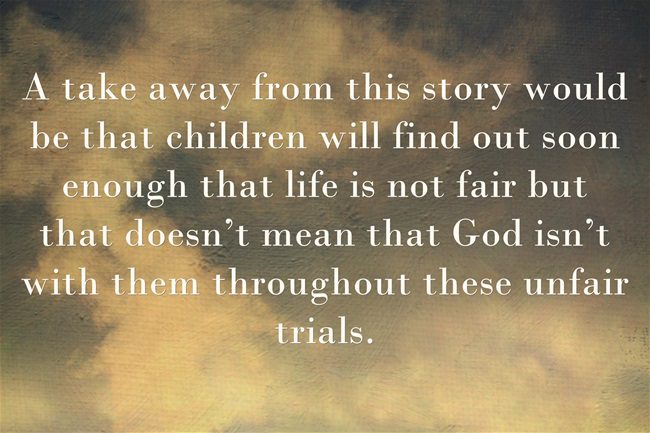What five Bible stories would be good to each young children? What specifically can we impart to them that they can carry with them for the rest of their lives?
The Prodigal Son
The Parable of the Prodigal Son is one of the tenderest stories in the Bible. The story is told in Luke 15:11-32 and has the younger son coming to his father and asking for his inheritance ahead of time. This is essentially telling his father “I wish you were dead. Give me my inheritance now.” The father gives him what he asks for and then the son leaves and spends all of it on sinful activities. When the boy runs out of money he ends up working for a pig farmer and is so hungry that he ends up desiring the slop that he feeds the pigs with. Finally, when he hits rock bottom and realizes that even his father’s hired hands (servants) have it better than he does, he returns to his father, ready to ask for his forgiveness. The lesson here is that since the prodigal’s father was looking down the road for his son’s return and then ran out to greet him, how much more so can parents love their children unconditionally and always be willing to forgive them? Parental love should be like that of the prodigal son’s father. Parents should be eager to see their children return and then run to greet them and be swift in forgiving them. Children who see this story reflected in their parent’s love for them stand a better chance at returning from the “pig pen” of their lives with no fear of condemnation. We should give them what they don’t deserve because God loved us while we were still His enemies and still yet sinning (Rom 5:8, 11).
David and Goliath
The story of David versus Goliath in 1 Samuel 17 reminds children that we all face giants in our lives from time to time but faith or trust in God can help us not to be overwhelmed for Paul wrote that if God is for us, who in this world could ever be against us (Rom 8:31)? Can this story help when our children face the inevitable bullies in school? I believe it can. The main lesson in this story is that it is actually God who delivered Goliath into David’s hand and not David. David confidently said “The Lord, who delivered me from the paw of the lion and from the paw of the bear, He will deliver me from the hand of this Philistine” (1 Sam 17:37). When David finally faced Goliath, listen to his confidence, not in himself, but in God: “David said to the Philistine, “You come to me with a sword, with a spear, and with a javelin. But I come to you in the name of the Lord of hosts, the God of the armies of Israel, whom you have defied. This day the Lord will deliver you into my hand, and I will strike you and take your head from you. And this day I will give the carcasses of the camp of the Philistines to the birds of the air and the wild beasts of the earth, that all the earth may know that there is a God in Israel. Then all this assembly shall know that the Lord does not save with sword and spear; for the battle is the Lord’s, and He will give you into our hands” (1 Sam 17:45-47). We need to teach our children that the battles in this life must be fought in God’s strength and not in our own and that in time, maybe not that day, God will avenge us and so we must trust Him to repay our enemies (Rom 12:19). It is not our duty to avenge those who wrong us but leave this up to the Just Judge, God, and actually pray for our enemies (Matt 5:44).
Noah’s Ark
This story is one of redemption but also includes the wrath of God. God is slow to anger and merciful but in time, God saw “that the wickedness of man was great in the earth, and that every intent of the thoughts of his heart was only evil continually” (Gen 6:5), meaning that wickedness is all that mankind thought about and “that every intent of [their] heart was only evil continually.” In other words, all they thought about was sinning and every intentional thought was bent toward evil and when a person reaches that stage, God must move in wrath to judge this unrepentant sinner. Even so, God still allowed Noah to preach so that they could be spared from God’s wrath if they repented and put their trust in Him. It is believed that Noah preached this grace for 120 years but in time, God finally saw that mankind was not interested in repentance and all they thought about was new ways to sin. Since “Noah did according to all that God commanded him” (Gen 6:22) and that Noah alone was “righteous before [Him] in this generation” (Gen 7:1b) God was going to spare his family from the coming flood, which is a picture or image of His judgment upon sin. Something that is easily missed is the language which describes that God was on the ark already as God said “Come into the ark, you and all your household” (Gen 7:1a). If God were outside of the ark He would have said “go into the ark” but if someone is inside their home and they were to ask you to “come in,” they wouldn’t say “go into the house” but they would say “come into the house” because they were already inside. This language signifies that God was with Noah and his family and it wasn’t Noah who closed the ark’s door but it was “the Lord [Who] shut him in” (Gen 7:16c). This also shows that salvation is fully a work of God and not of man.
And God was with Joseph
When Joseph was unfairly sold into slavery by his brothers (Gen 38:1), Joseph didn’t wail or complain by saying “Why God?” but he simply understood that God’s would work out all things out in time, no matter what his life looked like (Rom 8:28) and time and again the Scriptures said that “The Lord was with Joseph” (Gen 39:2a). Even when Joseph was unfairly thrown into prison, it was still said that “the Lord was with him; and whatever he did, the Lord made it prosper” (Gen 39:23c). It’s interesting to note that almost 1/3rd of the Book of Genesis is about Joseph which means that the story of Joseph was important to God. Frequently, when there are many Scriptures given to a subject or topic, it is important to God. For example, God’s Law has the longest chapter in the Bible (Psalm 119) showing that God’s Law and obedience to it is especially important to God. Similarly, much of Genesis is reserved for the story of Joseph and how we often suffer unfairly but God is still with us even when He is silent. Prior to Joseph’s account, God directly spoke to the Patriarchs but God never directly spoke to Joseph but it was still written, time and again, that “the Lord was with Joseph.” A take away from this story would be that children will find out soon enough that life is not fair but that doesn’t mean that God isn’t with them throughout these unfair trials.
Daniel in the Lion’s Den
In Daniel chapter six we see that Daniel was thrown into the lion’s den because he would rather obey God and pray to Him than to pray to a pagan king. Daniel may have thought that his life was about to end but this didn’t stop him from doing what is right. Even King Darius didn’t want Daniel to die and so spent a sleepless night trying to think of a way to save him while not going against his own decree that he had been tricked into writing by Daniel’s enemies who were jealous of his position of authority (Dan 6:2-5). When Daniel was helpless he had a God Who was not. God stopped the lion’s mouth through an angel of God (Dan 6:22) showing that God is still sovereign over nature, rulers, and all beasts of the earth (Dan 6:23-27). The lesson children could learn here is that no matter what things look like, God is still in control. Nothing gets by Him and He defends the defenseless. Sometimes we will be hated because of our faith or sometimes people will be jealous of us but we must do what is right because “We ought to obey God rather than men” (Acts 5:29).
Conclusion
Every one of us will have to face our giants in this life, we will all be treated unfairly at some point, we’ll all be put into positions that look impossible to get out of, and God desires that everyone repents and trusts in Him. God is a God of mercy and desires that all be saved (1 Tim 2:4) but He is also a God of wrath (John 3:36b) and cannot overlook sin (Rom 3:23, 6:23) but while we were still sinners, He died for us (Rom 5:8) so if you repent today and put your trust in Him, you too can be spared (John 3:16-17)…even if you are shut up in a lion’s den.
Another Reading on Patheos to Check Out: What Did Jesus Really Look Like: A Look at the Bible Facts
 Article by Jack Wellman
Article by Jack Wellman
Jack Wellman is Pastor of the Mulvane Brethren church in Mulvane Kansas. Jack is also the Senior Writer at What Christians Want To Know whose mission is to equip, encourage, and energize Christians and to address questions about the believer’s daily walk with God and the Bible. You can follow Jack on Google Plus or check out his book Blind Chance or Intelligent Design available on Amazon












